How The West Was Won: The 1998 Pacific Men's Soccer Team - Part 2
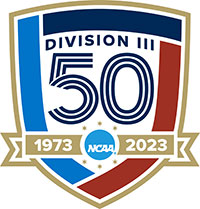 In 2023-24, NCAA Division III celebrates its 50th anniversary while Pacific University and other Northwest Conference institutions celebrate 25 years as full Division III members. As part of that celebration, we are chronicling the story of Pacific’s 1998 men’s soccer team, the first Boxer team to qualify for the NCAA postseason.
In 2023-24, NCAA Division III celebrates its 50th anniversary while Pacific University and other Northwest Conference institutions celebrate 25 years as full Division III members. As part of that celebration, we are chronicling the story of Pacific’s 1998 men’s soccer team, the first Boxer team to qualify for the NCAA postseason.
Part two of this three-part series is a journey through the regular season, from a tough non-conference slate against Division II and NAIA teams to the Boxers’ tremendous finish.
1998 Pacific Men's Soccer Schedule & Results | 1998 Box Scores | 1998 NWC Statistics
Part 1: Welcome To The Association
Part 2: Great Expectations
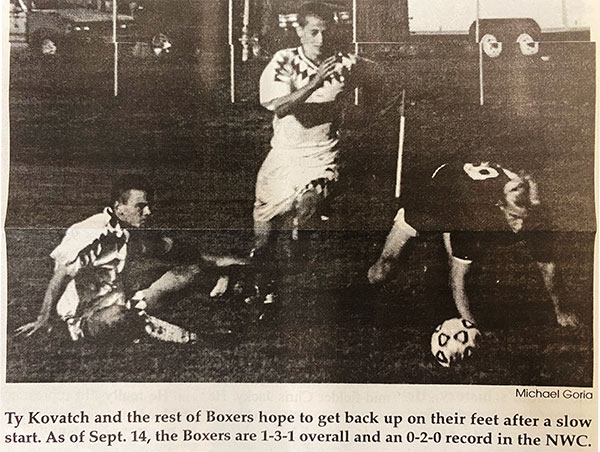 If there was any given for the 1998 Pacific menʻs soccer season, it was that the season was not going to start easy. And that was by design.
If there was any given for the 1998 Pacific menʻs soccer season, it was that the season was not going to start easy. And that was by design.
“We never worried about our record in non-conference. We worried about how good of competition we could play,” said head coach Jeff Enquist ʻ98.
Despite that approach, the Boxers always fared well against those tough teams, which often included NCAA Division II programs and NAIA powers. No Pacific non-conference win was bigger than a 2-0 shutout of Oregon State to close the 1996 regular season, shocking former Pacific head coach and Portland Timbers legend Jimmy Conway.
The non-conference schedule for the Boxersʻ first year as an NCAA Division III side was no different. It opened on Sept. 5 at Western Washington, which had won 12 matches in 1997 and reached the NAIA Pacific Northwest semifinals before falling to eventual national champion Seattle University. Like the Boxers, the Vikings were themselves in transition, competing in their first season as a Division II program.
Pacific opened with a winner in enemy territory, 2-1, on goals by sophomore Scott Heuston ‘01 and Rusty Sandusky ʻ99. The Vikings’ only goal came on a 15th-minute penalty kick despite outshooting the Boxers 16-13.
The next day, Pacific struggled in a neutral-site match in Bellingham against Simon Fraser, another perennial NAIA power that had lost to Seattle U. in the 1997 NAIA regional final. Pacific managed just one shot, from Heuston, in a 2-0 loss. Both of SFU’s goals came in the first 13 minutes of the match. The match also saw freshman Ryan Stanley ’02 assume the starting goalkeeping role when Logan Williams ’01 was injured at the end of the first half.
Pacific showed better on Sept. 9 at Concordia, tying 0-0. The Boxers were outshot by the Cavaliers 13-11 with Stanley making seven saves in his first start to send Pacific into conference play a 1-1-1 record.
“Our goal was to be .500 coming out of non-conference play, if we could get there,” Enquist said. “When you throw in Western Washington at their place and then Simon Fraser, which was almost a home game, you’re playing really good teams. And Concordia had a lot of scholarship money and financial aid. Those games led us to being able to spin forward later.”
Maybe it was too tough. Northwest Conference play commenced at Puget Sound on Sept. 12, with the Boxers falling 2-1 despite a comeback that saw Sandusky score his second goal of the season in 80th minute. The next day, at defending NAIA national champion Seattle U., the Boxers couldn’t find the net in a 3-0 loss. Sandusky had four of the team’s nine shots on the day as all three of the Seattle’s goals came in the second half.
After the solid start in non-conference play, the Boxers were suddenly 1-3-1 and 0-2 over the first two conference matches. It was early, but emotions were already running high.
“(Enquist) was pissed off. We didn’t play that well,” Chris Burke ʻ00 said. “He put his hand through the back of a van window.”
Ben Hoang ʻ00 remembers that it was a combination of match results and the coach’s concerns about the senior leadership causing emotions to boil over.
“Coach wanted to leave early and one of our players wasn’t around,” said Hoang, who was one of the captains charged with making sure players made it to the vans. “I was sitting in the van and here he comes. Whether he put his hand right through it, I don’t remember for certain, but his hand was bleeding after the fact.”
The fact that Pacific never beat Seattle U. (0-8-1 all-time) still leaves a bitter taste in Sandusky’s mouth. He scored three goals against the Boxers’ nemesis but went 0-5 against them in five years.
“I’ve never really liked Seattle ever since my college years,” Sandusky said. “I will never forget how we could never beat Seattle U. To this day, I am not a big Seattle fan.”
The season-opening six-match road trip ended with a 3-2 win at Linfield that saw Sandusky complete the first of his three hat tricks of the season. The Boxers didn’t put the match away until Sandusky buried his third off of an assist by Alan Abrams in the 87th minute.
When Pacific finally made it home to face Whitman on Sept. 19, the Boxers found themselves uncharacteristically challenged against a team that won just three matches all season. After a 0-0 score in the first 45 minutes, Whitman shocked Pacific with two goals in the first three minutes of the second half. The Boxers took both goals back before Whitman pulled ahead 3-2 in the 77th minute.
Pacific made the last 10 minutes count and Sandusky was a part of it, but this time in the role of playmaker. The senior assisted on both goals by Ty Kovatch ’01 in the 81st and 85th minute that opened the home slate with a 4-3 win, evening the team’s record to 3-3-1 overall and 2-2-0 in conference play. The next day, Pacific received a pair of goals from midfielders Brad Day ’00 and Heuston for a 2-0 shutout of Whitworth.
Over the first seven matches of the season, Pacific was beaten up and challenged. The Boxers had allowed 13 goals against eight scored and had struggled against teams that would finish at both the top and the bottom of the conference standings. But the opening home weekend proved to be a turning point that saw the Boxers gel, the defense tighten and the team become the hottest in the conference.
“There’s been some good points and some bad points so far,” assistant coach Tim Copeland ’94 told the Pacific Index student newspaper following the home openers. “Inconsistency has been our biggest problem and injuries have been a major source of that. We still have our best soccer to play.”
Pacific capped the month of September with a home split, scoring a 1-0 victory over Willamette on Sept. 23 before dropping a 3-0 decision to George Fox on Sept. 26 that saw the Bruins score three times on just seven shots.
The Hunt For Red (And Black) October
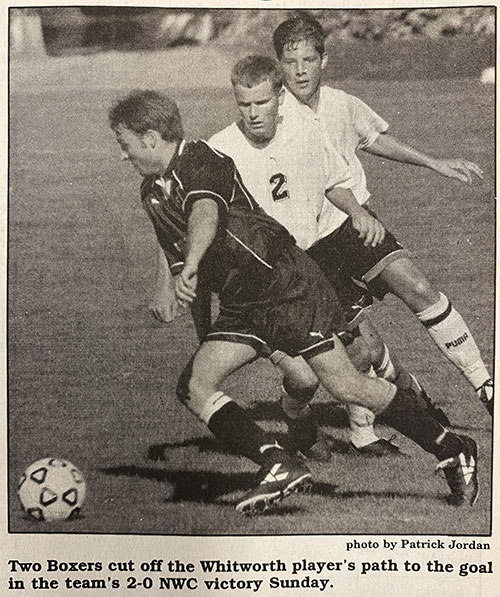 Pacific played six of its first 10 matches of the season on the road. The second half not only featured a balanced schedule of five home matches and five away matches, but also brought the conferenceʻs toughest opponents to Tom Reynolds Field.
Pacific played six of its first 10 matches of the season on the road. The second half not only featured a balanced schedule of five home matches and five away matches, but also brought the conferenceʻs toughest opponents to Tom Reynolds Field.
October, however, began with a critical match at Pacific Lutheran, the only road fixture in a string where the Boxers played seven of eight at home. Heuston scored the game-winner in the 113th minute in a 2-1 overtime comeback victory where the Boxers outshot the Lutes 16-7 but did not score until the 71st minute.
More critical than the win, however, was a change to the lineup. After playing the first half of the season in the defense, Burke moved full-time to forward, thanks in part to an injury that rendered Ty Kovatch ʻ02 unavailable for three weeks.
The change paid dividends with Burke scoring six goals with four assists from that point. It also freed Sandusky up to be an even more efficient goal-scorer, netting eight of his 14 from October on. When Kovatch returned, Enquist slotted him as an attacking midfielder.
“My guess is that Jeff was trying to hide me a little bit in terms of not creating a weakness in the defense, but it flipped,” Burke said. “People had to guard me and you just couldnʻt let me sit there. I wasnʻt the most skilled player, but I was big enough and strong enough that I could act as that target and then have all of the quick guys run off of me.”
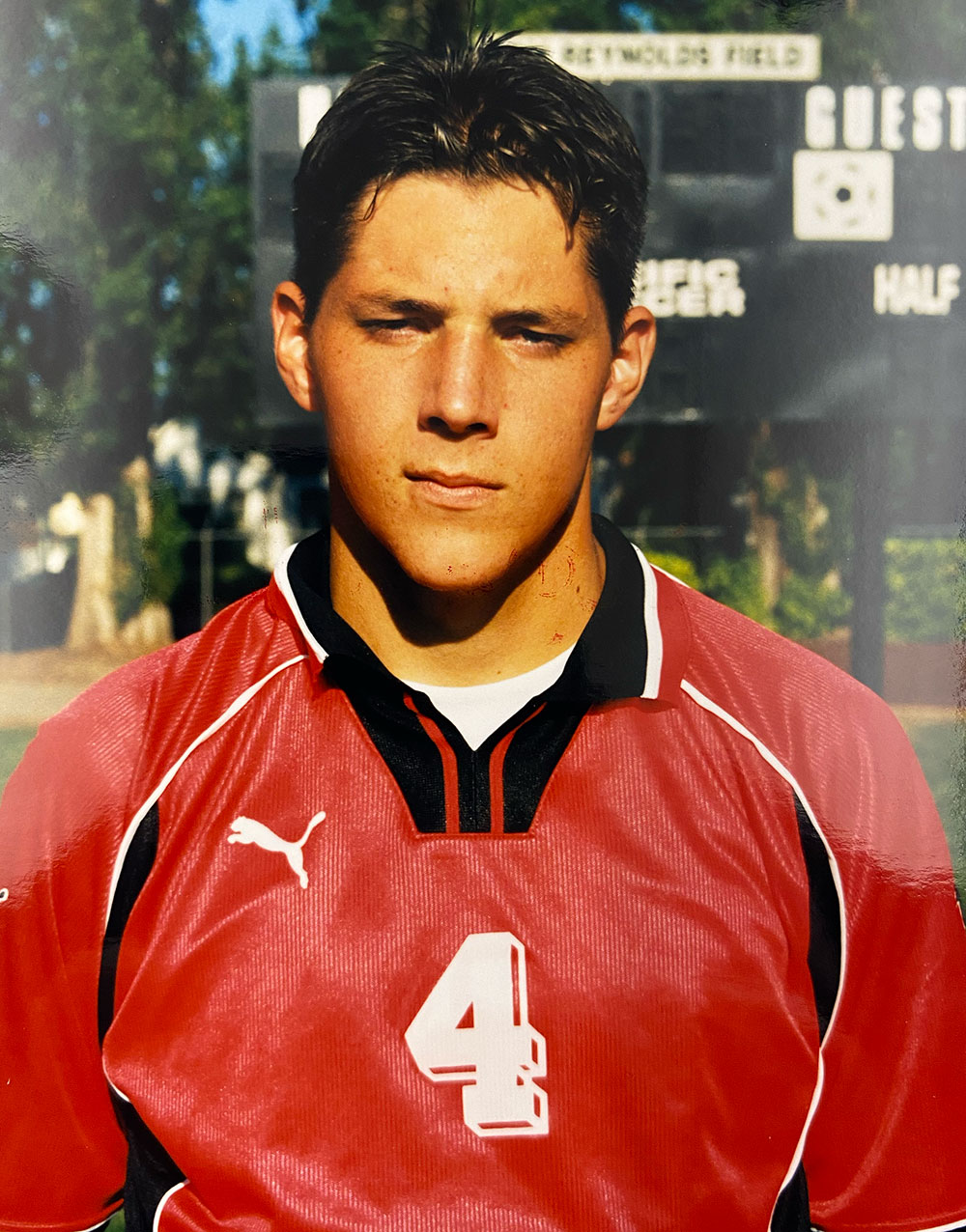 “He was like having a seven-foot center in Division III basketball,” Enquist said of Burke. “You just lob the ball in there and let him go get it. Chris demanded so much attention that it opened other players like Rusty to have a lot of space to play. Nobody could key on one player with that.”
“He was like having a seven-foot center in Division III basketball,” Enquist said of Burke. “You just lob the ball in there and let him go get it. Chris demanded so much attention that it opened other players like Rusty to have a lot of space to play. Nobody could key on one player with that.”
It was also a coming-of-age match for Stanley. After the season-ending injury to Logan Williams ʻ01 against Simon Fraser, the freshman had played 825 consecutive minutes. He wouldnʻt leave the pitch the rest of the season. By the of his career, his 7,154 career minutes in five seasons (including an injury-shortened 1999 season) ranked No. 11 all-time among Division III goalkeepers.
“I came up with some big saves in the first half and I came off at halftime and let everybody know how I felt,” Stanley said. “I got some head turns from a couple of guys and the seniors thinking, ʻWho the hell is this guy talking to us like this?ʻ I was like ʻWeʻre leaving people unmarked. Iʻm making saves. Letʻs pick it up and letʻs do something.ʻ"
Returning home on Oct. 7, the Boxers completed the season sweep of Linfield with a 2-1 victory, scoring both goals in the first half with Burke contributing the game-winner in the 35th minute. Three days later, Seattle U. hung its second 3-0 victory of the season on the Boxers. The team’s 31 shots were the most the Pacific defense allowed all season.
It was the last time Pacific lost during the regular season. Over the teamʻs final seven matches, Pacific outscored opponents 14-2 despite being outshot 115-97, a testament to the ever-tightening defense and a young midfield that was starting to gel.
“I think we were able to get the rest of the guys to be more cohesive as a team, and we started to play better,” Sandusky recalled. “The midfield got used to our style of play. We learned each other's styles and we were able to go execute at a higher level.”
The run of seven home matches in eight dates ended on Oct. 11 with the Boxers avenging their earlier road loss to Puget Sound, 1-0. The toughest road trip of the NWC season followed the next weekend with back-to-back matches at Whitworth and Whitman.
“I always felt like the trip to Spokane and Walla Walla was going to decide your season,” Enquist said.
In Spokane on Oct. 17, Burke scored his third goal of the season in the 11th minute off of Dayʻs third assist of the year. The Pirates equalized the match in the 61st while the defense kept nine Pacific second-half shots from finding the net to force overtime. The Boxers needed just 15 seconds of extra time to score the game-winner, with Burke scoring again, this time unassisted.
The next day in Walla Walla, Whitman proved less of a challenge than it had earlier in the season, with the Boxers collecting a 3-0 shutout thanks to Sanduskyʻs second hat trick of the year. It was just the second time in program history that Pacific swept the eastern Washington road trip. No team has accomplished the feat since.
The offensive combination of Sandusky and Burke continued to produce, combining for six of the Boxers’ eight goals in the final four matches of the regular season. Many of those came off the skilled foot at Sandusky, who finished with 14 on the season to earn First Team All-NWC honors.
“He was just a fighter,” Enquist said. “He was always in the mix. He didn’t have a lot to say. He was a leader by how he played the game and how hard he worked.”
The Boxers had secured its second-place NWC finish when it hosted Evergreen State on Nov. 1, but wanted. A punctuation mark to make regional raters take notice. The Boxers did just thae, burying the Geoducks 4-0.
Sandusky was not to be denied, taking an astonishing 14 shots en route to his third hat trick of the season. After scoring his third goal in the 82nd minute, Enquist lifted Sandusky in favor of freshman Kiel Peck ’02. Sandusky was not pleased. Peck needed just one minute to score his only goal of the season.
“At halftime (despite a 2-0 lead), Jeff was losing it. He told us if we didn’t win, we were not going to get a bid. We were not going to make the playoffs,” Sandusky said. “He subbed me out and I was like, ‘Yeah, you’re right. I scored three goals. What else do you want?’ And we ended up getting the bid.”
The defense, meanwhile, was as tight as it was all season. After conceding a 59th-minute goal in a 2-1 road win at Willamette on Oct. 21, the Boxers amassed a streak of 301 scoreless minutes to close the regular season.
The team’s final regular-season road match, Oct. 24 at George Fox, sticks out in Enquist’s memory. While the Boxers went 8-5 against the Bruins in Enquist’s seven seasons, any road win in Newberg was a big one. Pacific outshot George Fox 17-13 with Burke’s 60th-minute goal off a Sandusky assist proving the difference in the 1-0 win.
“Winning at George Fox didn’t happen very often,” said Enquist, who won three times in Newberg in his career. “All you do is get back in the vans and come home as quick as possible.”
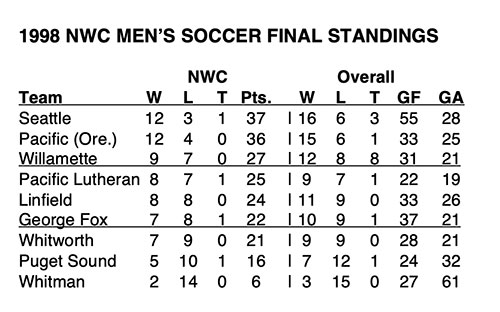 By the numbers, Pacific had done everything it could to prove itself worthy of the postseason. The Boxers’ 14-5-1 overall record was second in the NWC only to Seattle U., which went on to the NAIA national semifinals.
By the numbers, Pacific had done everything it could to prove itself worthy of the postseason. The Boxers’ 14-5-1 overall record was second in the NWC only to Seattle U., which went on to the NAIA national semifinals.
But was it enough for one of the five Division III West Regional playoff berths? The top two teams in the Minnesota Intercollegiate Athletic Conference, St. Olaf (15-2-0) and Macalester (14-2-0), had better records than Pacific as did Luther (18-3-1), the champs of the Iowa Conference. Cal Lutheran, which won the Southern California Intercollegiate Athletic Conference, finished a comparable 14-5 to the Boxers while second-place Chapman was 11-7-1.
Enquist, the conference’s representative on the West Region Advisory Committee, wasn’t sure.
“All we could do was put the results on board and wait and see what happens,” Enquist said. “We thought we would get it, but I was never sure. We assumed that we would either be going to Macalester or to Southern California.”
Despite his reservations, Enquist’s message to the team was one of total confidence.
“We said we were going to keep going until someone told us we weren’t. That was easy,” he said. “We put our heads down, worked hard and just tried to keep positive thinking that we had a reason to keep going. Fortunately, it worked out that way for us.”


